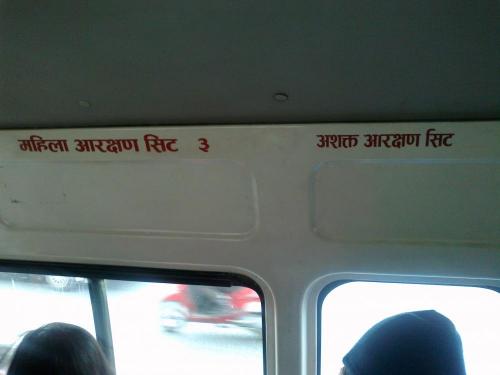
If you travel the valley in public transportation, you might have noticed that since a month all the micros are enforcing a strict women dedicated seats in all the routes. By entering the vehicles, you will notice that the first row of seats is dedicated to woman.
I had no idea about it, one day I just sat there and I was kindly asked to move to a back seat as where I was seating was just for women.
Then I gave a look around and indeed there was red writing in Nepali language that I guess means something like “only for women”.
I think here we are dealing with an incredibly important milestone in relation to gender policy in the country.
When recently the public transportation association also launched the first only female bus on a pilot basis, having all micro buses strictly adhering to a gender sensitive regulation is a big deal.
Let me explain. This is not a big deal only in terms of enforcement of gender friendly policies in Nepal but it is also a big thing because it means that with adequate will, policies in Nepal can be enforced.
Everybody complains about the fact that the country has millions of law, policies and regulations also thanks to the work efficiency of donor agencies that master the skill of policy writing.
Yet the enforcement of the only women seat policy implies that change can happen. I am pretty sure that it took years of lobbying, campaigning and grassroots advocacy to get all the private transporters on board to implement the regulation but then somehow, perhaps magically, it did happen and now the regulation is a reality and the Valley is slightly more gender friendly.
Oftentimes I think that underdevelopment is just about underperforming, an ecosystem of people, mindsets and attitudes that do not incentivize working the extra mile. A society underdeveloped is constantly below the standards.
Things can even be eventually done but how they are done as you might notice that a public work, though finished, still lacks few touches. For example the new sidewalks are quite nice but unfortunately many little touches are still missing without even considering that they are not disabled friendly.
What are the factors forcing people to do and reach the targets but not in the best possible way?
I am not sure, coming from a country traditionally with low esteem (and respect) for law enforcement, I would say that culture plays a big role in the way behaviors are set. Then I do remember many years ago paying a 250 EURO fine for a minor road infringement that posed no risk to anyone (roads were deserted) but proved that even in a country like Italy rules count.
A friend of mine would have found thousands of excuses for not paying a ridiculous ticket but I did not object: as ridiculous as the circumstances might have been, I made a violation of road code and I had to pay the consequences.
So culture could justify some attitudes and behaviors but oftentimes we hide ourselves before it and basically we used it as an excuse to justify ourselves.
Look at punctuality. I was never a guy on time, I almost liked others to wait for me. Then one day I went for a study tour in Munich with AIESEC, the international student association I was involved with when I was at the university and I got a cultural shock in terms of what being punctual means.
I do not think the fact that I am from Italy justified my poor behavior that actually is a lack of respect. Though I feel I meet many of the standard stereotypes about Italians, I think I am pretty much me, not certainly laid back as the common stereotype about Italians says.
Are the Nepali people normally late just because they are Nepali? Are rules not enforced simply because the culture is not conducive? Are things done in the Nepali way simply because there is not a proper system in place?
We should get rid of the “ke garne” culture and improve ourselves. After the cultural shock in Germany, I always tried to be on time not that I managed always to be but at least I make it an issue of trying my best to be.
Small things can make the difference. Let’s stop throwing stuff on the street, let’s think about our mini actions to make the places we live in better.
When you receive a text asking where you are, do not just simply reply “I am on the way” but say where you are and try to quantify the time it will take you to reach the destination.
Do we want to change Nepal? Let’s start with raising our personal standards. Together we give a push to raise the national ones and make the nation a better place.
Going back to the “only women seats” policy, also persons living with disabilities have a right to reserved seats just behind the only woman places. This is also another great step towards a little bit more inclusive society.
If we believe, the future is not doomed at all for Nepal, politics notwithstanding.










Add new comment